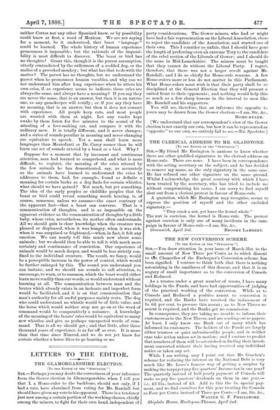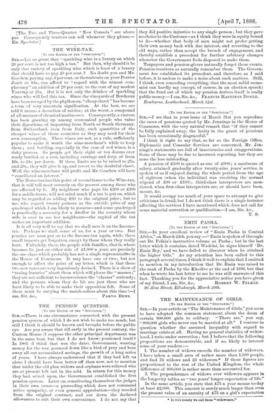THE NEW CONVERSION SCHEME.
[To THE EDITOR OF THE "SPECTATOR."]
Stu,—You draw attention in your issue of March 31st to the small amount of New Three per Cents. as to which dissent to tfte Chancellor of the Exchequer's Conversion scheme has been signified. I venture to think both that there is nothing astonishing in the smallness of this dissent, and that it is an augury of small importance as to the conversion of Consols and Reduced.
As a trustee under a great number of trusts, I have many holdings in the Funds, and have had opportunities of judging of the practical working of the conversion. While as to Consols and Reduced a positive assent to conversion is required, and the Banks have received the inducement of is. 6d. per cent, to procure this assent ; as to New Threes no assent is required, and the Banks get no commission.
In consequence, they are taking no trouble to inform their customers as to the New Threes, and are sending out no papers. At least, I only know one Bank out of many which has informed its customers. The holders of the Funds are largely either trustees or quiet unbusinesslike people, and in neither case take action unless set in motion; and I venture to predict that numbers of them will be astonished on finding their invest- ment converted without their having received any individual notice or taken any act.
While I am writing, may I point out that Mr. Goschen's scheme for reducing the interest on the National Debt is very much like Mr. Lowe's famous way of getting a surplus by making the taxpayer pay five quarters' Income-tax in one year? The quarterly instead of half-yearly payment of Consols will make us pay five quarters' dividends on them in one year,- i.e., £3 15s., instead of £3. Add to this the 5s. special pay- ment, and we find ourselves for this year treating the Consols as Four per Cents. instead of Three per Cents.—I am, Sir, &c., WALTER G. F. PHILLIMORE.
Shiplake House, Henley-on-Thames, April 2nd. [The Two and Three-Quarter "New Consols" are above par. Consequently trustees can sell whenever they please.— ED. Spectator.]



































 Previous page
Previous page